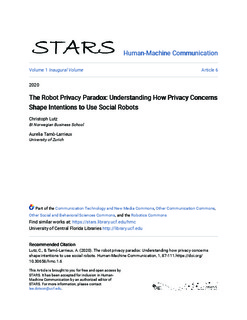| dc.contributor.author | Lutz, Christoph | |
| dc.contributor.author | Tamò-Larrieux, Aurelia | |
| dc.date.accessioned | 2020-02-10T13:26:12Z | |
| dc.date.available | 2020-02-10T13:26:12Z | |
| dc.date.created | 2019-10-02T11:37:58Z | |
| dc.date.issued | 2020 | |
| dc.identifier.citation | Human-Machine Communication Journal (HMC). 2020, 1 (1), 87-111. | nb_NO |
| dc.identifier.issn | 2638-602X | |
| dc.identifier.uri | http://hdl.handle.net/11250/2640785 | |
| dc.description.abstract | Conceptual research on robots and privacy has increased but we lack empirical evidence about the prevalence, antecedents, and outcomes of different privacy concerns about social robots. To fill this gap, we present a survey, testing a variety of antecedents from trust, technology adoption, and robotics scholarship. Respondents are most concerned about data protection on the manufacturer side, followed by social privacy concerns and physical concerns. Using structural equation modeling, we find a privacy paradox, where the perceived benefits of social robots override privacy concerns. | nb_NO |
| dc.language.iso | eng | nb_NO |
| dc.title | The Robot Privacy Paradox: Understanding How Privacy Concerns Shape Intentions to Use Social Robots | nb_NO |
| dc.type | Journal article | nb_NO |
| dc.description.version | publishedVersion | nb_NO |
| dc.rights.holder | This Article is brought to you for free and open access by STARS. It has been accepted for inclusion in HumanMachine Communication by an authorized editor of STARS. For more information, please contact lee.dotson@ucf.edu. | nb_NO |
| dc.source.pagenumber | 87-111 | nb_NO |
| dc.source.volume | 1 | nb_NO |
| dc.source.journal | Human-Machine Communication Journal (HMC) | nb_NO |
| dc.source.issue | 1 | nb_NO |
| dc.identifier.doi | 10.30658/hmc.1.6 | |
| dc.identifier.cristin | 1732951 | |
| dc.relation.project | Norges forskningsråd: 247725 | nb_NO |
| dc.relation.project | Norges forskningsråd: 275347 | nb_NO |
| cristin.unitcode | 158,9,0,0 | |
| cristin.unitname | Institutt for kommunikasjon og kultur | |
| cristin.ispublished | true | |
| cristin.fulltext | original | |
| cristin.qualitycode | 0 | |
